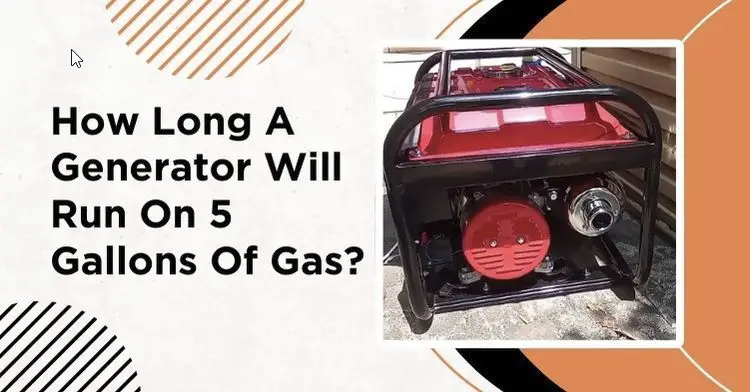How Long a Generator Will Run on 5 Gallons of Gas?
Updated: February 1, 2026
How long a generator will run on 5 gallons of gas depends on its wattage, load, and efficiency. A typical portable generator runs 8-12 hours on 5 gallons at 50% load. In this guide, we’ll break down the exact runtime for different generator sizes and share tips to maximize fuel efficiency.
Contents
- 1 What factors affect how long a generator will run on 5 gallons of gas?
- 2 How to calculate the fuel efficiency of a generator?
- 3 What’s the best way to store gasoline for Portable generators?
- 4 What are the tips for regular maintenance to prolong the life of your generator?
- 5 How to safely start and stop a generator?
- 6 How long will a 5-gallon gas tank last on a generator for power outage emergencies?
- 7 Tips to Maximize Runtime on 5 Gallons of Gas
- 8 Portable Generators and Fuel Capacity
- 9 Fuel Management and Refueling
- 10 What are the tips for safely using a generator during power outages?
- 11 Frequently Asked Questions
- 12 Conclusion
What factors affect how long a generator will run on 5 gallons of gas?

There are a few factors that affect how long a generator can run on 5 gallons of gas:
- The size of the generator’s fuel tank: A larger tank will be able to hold more gas and therefore run for longer.
- The engine’s efficiency: A more efficient engine will require less gas to produce the same amount of power and be able to run for longer on a given amount of fuel.
- The load on the generator: The lighter the load, the longer the generator will be able to run. Running the generator at full load depletes fuel more rapidly compared to partial load operation. If you’re only running a few small appliances, the generator will be able to run for much longer than if you’re trying to power your whole house.
- Generator size: Larger generators consume more fuel compared to smaller ones. Selecting the appropriate generator size based on power needs is crucial to optimize fuel economy and performance. Consider load demand and efficiency when choosing the generator size.
How to calculate the fuel efficiency of a generator?
This is a great question and one that gets asked a lot! The answer, unfortunately, isn’t quite so simple. The fuel efficiency of a generator depends on several factors, and they may vary depending on the type.
In the first place, the size and shape of the generator are something to think about. A more significant generator will typically be more fuel-efficient than a smaller one. This is because it takes less fuel to run at its optimal operating speed, which means it will use less fuel overall.
Another important aspect is the rated output of the generator. The rated output affects fuel consumption and runtime, with generators running more efficiently when the load is closer to their rated capacity. A generator running at a lower load than its rated output will consume more fuel per unit of power generated, reducing overall efficiency.
Another factor to consider is the load on the generator. If you’re running a lot of devices or pulling a lot of power from the generator, it will use more.
What’s the best way to store gasoline for Portable generators?
The best way to store gasoline for a generator is to use a stabilization additive. This will help keep the gas from breaking down and going bad. You can find these additives at most hardware stores or online.
Read the package instructions carefully before using them. Additionally, it’s good to store your gasoline in an airtight container in a cool, dark place. This will help prevent evaporation and degradation of the fuel. Following the manufacturer’s guidelines for storing gasoline can help maintain fuel quality and ensure efficient generator performance.
What are the tips for regular maintenance to prolong the life of your generator?
In order to ideally extend the life of your generator, the following tips should be followed:
- Keep it clean –Regularly clean the generator using a soft brush and mild detergent. Make sure that any dirt, dust, or debris is cleaned from the fan blades and around the motor.
- Check oil level –Always keep the oil level topped off to prevent wear and tear on the engine.
- Maintain proper distance –Keep at least 2 feet of clearance between the generator and other objects.
- Use a surge protector –Plug sensitive electronics into a surge protector to protect them from voltage spikes or surges.
- Avoid overloads –Don’t overload the generator by trying to run too many appliances at once.
How to safely start and stop a generator?
If you’re wondering how to start and stop a generator safely, you’re not alone. Many people don’t know the ins and outs of properly using this handy tool. Here are some tips to keep in mind:
First and foremost, always read the owner’s manual before attempting to start or stop a generator. Each model is different, so it’s essential to understand the specific instructions for your machine.

If possible, have an assistant help you start and stop the generator. This can be especially helpful if you’re dealing with a large unit.
Never try to start or stop a generator while it’s still plugged into an outlet. Doing so could cause severe injury or damage to the equipment.
How long will a 5-gallon gas tank last on a generator for power outage emergencies?
That depends on how and what you use the generator for. If you’re running appliances that draw a lot of power, like a refrigerator, freezer, or air conditioner, your gas tank will likely only last for a few hours. The runtime of a generator running during a power outage depends on the load and fuel consumption.
However, if you’re only using the generator for lights and a few small appliances, it could last for a couple of days on one gas tank. It depends on how much power you’re using and what size your generator is. Cold weather can affect generator performance, leading to increased fuel consumption and decreased efficiency.
In any case, it’s always a good idea to have at least one backup plan in case of an extended power outage. That could include having a stash of food and water that will last for several days and keeping a generator fuel.
Below is a Generator Comparison Table featuring 10 popular generators. The table compares their fuel tank capacities, estimated fuel consumption rates at half load, and expected runtimes on 5 gallons of gas. Please note that the fuel consumption rates and runtimes are approximate values and can vary based on specific operating conditions, maintenance, and generator models.
| Generator Model | Fuel Tank Capacity (Gallons) | Fuel Consumption Rate at Half Load (Gallons per Hour) | Expected Runtime on 5 Gallons of Gas (Hours) |
|---|---|---|---|
| Honda EU2200i | 0.95 | 0.12 | 41.7 |
| Yamaha EF2000iSv2 | 1.1 | 0.11 | 45.5 |
| Westinghouse WGen7500 | 6.6 | 0.66 | 7.6 |
| Champion 3400-Watt Dual Fuel | 1.6 | 0.31 | 16.1 |
| Generac GP5500 | 7.2 | 0.65 | 7.7 |
| DuroMax XP12000EH | 8.3 | 0.95 | 5.3 |
| WEN 56200i | 1 | 0.1 | 50 |
| Predator 3500 Inverter | 2.6 | 0.24 | 20.8 |
| Firman W03083 | 1.8 | 0.16 | 31.3 |
| Briggs & Stratton P2200 | 1 | 0.12 | 41.7 |
Notes:
- Fuel Consumption Rate at Half Load: This is an estimated value of how much fuel the generator consumes per hour when operating at half of its maximum capacity.
- Expected Runtime on 5 Gallons of Gas: Calculated by dividing 5 gallons by the fuel consumption rate at half load (Runtime = 5 gallons ÷ Gallons per Hour).
Example Calculation:
For the Honda EU2200i:
- Fuel Consumption Rate: 0.12 gallons per hour
- Expected Runtime: 5 gallons ÷ 0.12 gallons/hour ≈ 41.7 hours
Tips to Maximize Runtime on 5 Gallons of Gas
- Efficient Load Management: Only connect essential devices to reduce the load and fuel consumption.
- Regular Maintenance: Keep the generator well-maintained to ensure it operates efficiently.
- Quality Fuel: Use fresh, high-quality gasoline and consider fuel stabilizers.
- Environmental Awareness: Operate the generator in optimal conditions to prevent unnecessary fuel consumption due to overheating or other inefficiencies.
Our articles where you can find the best oil for Generac 22kw Generator and best oil for Champion Generator.
Portable Generators and Fuel Capacity
Portable generators come in various sizes, and their fuel capacity can significantly impact their runtime. A larger generator typically has a bigger fuel tank, allowing it to run for longer periods. However, the actual runtime depends on several factors, including the load, generator efficiency, and fuel type.
For instance, a small generator with a 1-gallon tank may run for about 4-6 hours at half load, while a larger generator with a 5-gallon tank can run for up to 12 hours at the same load. This difference is crucial when planning for power outages or outdoor activities where continuous power is needed.
When selecting a portable generator, it’s essential to consider both the fuel capacity and the expected runtime. A larger generator might be more suitable for extended use, but it will also consume more gas. On the other hand, a small generator might be more fuel-efficient but will require more frequent refueling. Understanding these dynamics can help you choose the right generator for your specific needs.
Fuel Management and Refueling
Proper fuel management is crucial to ensure the longevity and efficiency of your portable generator. Here are some tips to help you manage your fuel and refueling:
- Follow Manufacturer’s Guidelines: Always adhere to the manufacturer’s guidelines for fuel type and capacity. This ensures that your generator runs efficiently and reduces the risk of damage.
- Use a Fuel Stabilizer: Adding a fuel stabilizer can help maintain fuel quality and prevent issues that arise from stale fuel. This is especially important if you store fuel for extended periods.
- Store Extra Fuel Safely: Keep extra fuel on hand, stored safely in approved containers. This can extend the operational time of your generator during prolonged power outages.
- Refuel Safely: Always refuel your generator when it’s turned off and cooled down to avoid the risk of fire or explosion. Never refuel while the generator is running.
- Regular Maintenance: Regularly check and maintain your generator’s spark plugs, air filters, and other critical components. This ensures optimal performance and fuel efficiency, reducing the amount of gas consumed.
By following these tips, you can ensure your portable generator runs efficiently and effectively, providing you with reliable power during power outages or outdoor activities. Proper fuel management not only extends the life of your generator but also ensures that you have power when you need it most.
What are the tips for safely using a generator during power outages?
There are a few things you need to keep in mind when using a generator during an emergency power outage:
- Always use generators outdoors, away from windows and doors. This will help prevent carbon monoxide poisoning.
- Only use generators rated for the number of appliances and devices you need to power. Overloading a generator can damage it and cause a fire.
- Be sure to regularly check and maintain your generator, following the manufacturer’s instructions. This will help ensure it continues to work safely and correctly.
Frequently Asked Questions
How long can a generator run on 5 gallons of gas?
A generator’s runtime on 5 gallons of gas varies based on its size and the load it’s powering. On average, a small to medium-sized generator can run between 8 to 12 hours at half load on 5 gallons of gasoline.
What factors influence a generator’s fuel consumption?
Factors include the generator’s engine efficiency, the electrical load (how many devices you’re powering), maintenance condition, and environmental conditions like temperature. Higher loads and poor maintenance increase fuel consumption.
How can I extend the runtime of my generator on 5 gallons of gas?
To maximize runtime, use energy-efficient appliances, minimize the number of devices connected, perform regular maintenance, and ensure the generator is operating at its optimal capacity.
Does the type of fuel affect how long my generator will run?
Yes, the type of fuel can impact runtime. Diesel generators are generally more fuel-efficient than gasoline ones. Additionally, using fresh, high-quality fuel and adding fuel stabilizers can improve performance and efficiency.
Conclusion
Now that you know how long a generator will run on 5 gallons of gas choosing the right one for your needs is important. It is necessary to consider many factors, including the wattage rating and the type of fuel used. You can always turn to the team at Generator Finder if you need help selecting the correct generator. With years of experience, we have helped people find generators that fit their specific needs. Contact us today for more information!
Related Article

